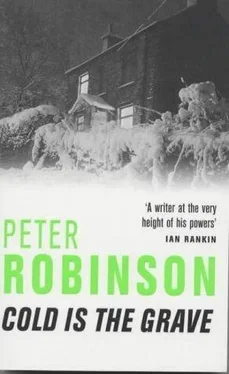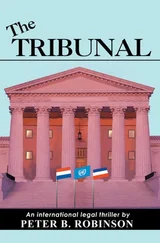Annie paused briefly at the market square to watch the awestruck expressions on the children’s faces as they gathered around the Christmas tree. It took her back to her own childhood in St. Ives. There had been few, if any, practicing Christians down at the commune where she had grown up. Most of the people who passed through had no religion at all, other than ART, and those who had tended toward the more esoteric kinds, such as Zen Buddhism and Taoism, the ones without God, where you could ponder the meaning of nothingness and the sound of one hand clapping. Annie herself, with her meditation and yoga, came closer to Buddhism than anything else, though she never professed to be a Buddhist. She wasn’t detached enough, for a start; she knew that desire caused suffering, but still she desired.
Christian or not, every Christmas had been a festive time for Annie and the other kids there. There were always some other children around, though most of them never stayed long, and she got used to her friends’ moving away, being dependent on herself, not on others. But at Christmas, someone always came up with a tree, and someone else scrounged around for some tinsel and decorations, and Annie always got Christmas presents from whoever was living there at the time, even if many of them were just sketches and small hand-carved sculptures; she still had most of them, and some were worth a bit now – not that she would ever sell them. Christmas was as much a tradition at the commune as anywhere else, and it always brought back memories of her mother. She still had a photograph of her mother holding her up to look closely at the tree decorations. She must have been two or three years old, and though she couldn’t remember the moment itself, the photograph always brought back waves of nostalgia and loss.
Shrugging off the past, she walked on to the Jolly Roger.
Eastvale didn’t have a large student population, and the college itself was an ugly mess of red brick and concrete boxes on the southern fringes of the town, surrounded by marshland and a couple of industrial estates. Nobody wanted to live out there, even if there had been anywhere to live. Most of the students lived closer to the town center, and there were enough of them to turn at least one pub into the typical student hangout, and “the Roger,” as they called it, was the one.
On first impression, Annie thought, the Jolly Roger was no different from any other Victorian-style pub on Market Street, but when she looked around inside, she noticed it was more run-down, and there was an odd selection of music on the jukebox, including far more angry, alternative stuff than pleasant pop and big-name bands. The clientele at that time in the afternoon consisted mostly of students who had finished early or had been there since lunchtime. They sat in small groups, smoking, chatting and drinking. Some favored the scruffy, Marxist look of old, while others cultivated a more clean-cut Tony Blair style, but they all seemed to mix cheerfully together. One or two loners in thick glasses sat at tables reading as they slowly sipped their pints.
Annie went to the bar and pulled out the fuzzy image taken from the CCTV video.
“I’ve been told you might know this couple,” she said to the young man behind the bar, who looked like a student himself. “One of our lads had a word yesterday.”
“Not me, love,” he said. “I wasn’t on yesterday. That’ll be Kath over there.” He pointed to a petite blonde busy pulling a pint and chatting to another girl across the bar. Annie walked over and showed her the photo.
“Any more thoughts on who this might be?” she asked, after introducing herself.
“I’ve given it a bit of thought,” said Kath, “but I can’t say as I have. I know I’ve seen them here, but I just can’t place them.”
“Let’s have a look, Kath,” said the girl. She didn’t look old enough to be drinking, but Annie wasn’t there to enforce the licensing laws. She was dressed all in black, including her lace-trimmed gloves, with orange hair and a pale, pixieish face.
She looked at Annie. “If that’s all right with you,” she added.
“That’s fine,” said Annie. “We need all the help we can get.”
“I’m Sam. Short for Samantha.”
Annie didn’t think it was short for Samuel, but you never knew. “Pleased to meet you, Sam.”
“Lousy picture,” Sam commented. “That from the Big Brother video?”
“Yes,” said Annie, “it’s from the CCTV cameras in the market square.”
“Talk about an invasion of privacy,” the girl began. “You know-”
“I’d like to spend some time arguing the pros and cons of city center CCTV with you, Sam,” said Annie sweetly. “Really I would, but a young girl, probably no older than you, was murdered in the Bar None last week, and we’re trying to find out who killed her.”
“Yeah, I heard,” said Sam, looking away. “It’s a fucking shame a woman can’t go anywhere by herself these days.”
“Any idea who they are?”
“Course I do.”
“Will you tell me?”
“Did they do it?”
“I very much doubt it. But they might have seen something.”
“It’s Alex and Carly. Alex Pender and Carly Grant. Carly and I do art together.”
“Know where they live?”
“They’ve got a flat on Sebastopol Avenue, you know, one of those big old Victorian terraces. Landlords divide them up into poky flats and rent them out for a fortune. Talk about exploitation.”
“Do you know the number?”
Sam told her.
Knowing now the reasons for Annie’s erratic behavior didn’t make Banks feel any better. In fact, as the afternoon wore on, it made him feel worse. When she had stormed out of his office, he had stood for a moment to let his realization sink in, then felt the bile rise and burn in his throat. He might not be sleeping with Annie anymore, but the thought of her being with Dalton hurt. He had been through the same thing with Sandra. For months after she left, when he knew she had moved in with Sean, the intolerable images crowded his mind, and during the long nights of drinking alone, with random phrases from bitter Bob Dylan love songs echoing around his mind, the jealousy burned like acid on his soul.
Perhaps it wasn’t even jealousy, but envy: he couldn’t have Annie, but he couldn’t bear thinking about Dalton having her. Whatever it was, it hurt, and Banks had to make an effort to put it out of his mind for the time being and get on with the job.
First, he sent DC Templeton off to get copies made of the photo of Clough he had got from Craig Newton. It was a good shot, candid or not, and Craig had cropped it so that it showed only Clough in full, mean face. When that was done, he would send a team out to check every hotel and guest house in the area to see if Clough had been staying there recently. He would also have Jim Hatchley and Winsome Jackman show it around Daleview and Charlie Courage’s neighborhood. In the meantime, information had started trickling in now the working week had begun again.
He didn’t learn much from the Riddles’ phone records. British Telecom’s Investigations Department had furnished DC Templeton with a list of numbers called on the Riddles’ house telephone for the last month, and a subscriber check had supplied the names and addresses. Most seemed to be political cronies of Jimmy Riddle, or calls to Rosalind’s law office. Someone, Emily presumably, had phoned Ruth Walker’s number twice, but not within ten days of her death. There were no calls to either Craig Newton, Andrew Handley or Barry Clough. The only other calls Emily seemed to have made had been to Darren Hirst and to a sixth-form college in Scarborough. Banks thought it might be a good idea to get hold of Craig’s and Clough’s records, and do a cross-reference. It would take time, but it might throw up a lead of some sort. Oddly enough, Banks couldn’t find the call that Emily had made to him the day before she died. Then he remembered the background noise and realized she must have used a public telephone.
Читать дальше












